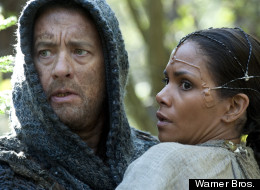I thought I must have misheard or misread when I got the news, somewhere, that the Wachowski siblings were making a film of the novel--which was published in 2004, and offered one of the most potent and moving reading experiences I’ve had in the last ten years. But then I read the Aleksander Hemon article in the September 10 issue of the New Yorker.
I found that article exhilarating, probably because, for once, I was reading about the making of a movie through the eyes, and in the words, of a fine writer. Reading about Andy and Lana Wachowski and Tom Twyker’s experience in adapting the novel for the screen was exhilarating. Three smart, creative people, in love with a book and in love with film, working doggedly to bring it together--and this story told by a fourth smart, creative person. When I finished the article I had to get up and walk around for a while-- which is often my reaction to something creative and exciting.
Reading about the filmmakers’ difficulty in securing funding, and their despair over the lack of originality in Hollywood studios’ vetting of films (recounted in this Huffington Post piece), made me root for this film. But then the next day I saw a picture in our local paper, in an article about upcoming fall films: Tom Hanks and Halle Berry in strange, half-primitive, half-futuristic make-up and costumes. And my heart sank.
It’s not that I don’t like these actors; I like them a lot. It’s just that they are so deeply connected, in my mind, with Hollywood, with fantasy and spectacle and a certain mindlessness when it comes to storytelling and entertainment. I couldn’t bear the thought of their assuming roles from this novel I’d so loved--the only novel I’ve finished in a flood of tears in a very long time. I couldn’t imagine their Hollywood bodies and faces in anything that wouldn’t diminish the experience of Cloud Atlas for me.
It’s partly that so much of the pleasure and power of Cloud Atlas the novel comes from its language. It’s difficult and unwieldy language at times, and it makes the kind of demands on a reader that so few (successful) creative works make today. Now people will know the novel as the source for a lavish--and, I’m sure, deeply moving--visual spectacle. But they probably won’t know it for its original, challenging, and heartbreakingly beautiful language. And I think that’s a terrible loss.
Here we are now, entertain us. Even that line from Nirvana is a dated reference now, I realize. But it still haunts me, in an age when college students can say that they enjoy “more traditional lectures”--by which they mean speakers who use a lot of Powerpoint. And that while we’re on that subject, why can’t they just watch the thing online?
The quiet pleasure of words, written or spoken: will we eventually lose this? Will I just be one of a handful of dinosaurs who mind?

